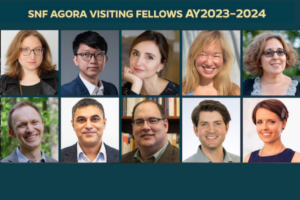
The SNF Agora Institute today announced its new cohort of visiting fellows, who will be part of the Johns Hopkins University community for the academic year beginning in fall 2023.
The incoming cohort includes journalists, artists, scholars, a poet, policy consultants, entrepreneurs, and nonprofit leaders. During their time at SNF Agora, they will be engaging with issues around democracy through a variety of lenses, tackling questions about the role of philanthropy in democracy, the relationship between veterans and civil society, the ways local opinion pages can provide a more vibrant print agora, the role of pop culture in get-out-the-vote efforts, and how climate change, historical racism, and land use policies intersect to impact our civic fabric, among other topics.
The SNF Agora Visiting Fellows program was created to support the mission of strengthening global democracy by expanding the institute’s reach and incorporating a broader range of people into its work. Through this program, the institute invites a select cohort of fellows from diverse sectors, disciplines, backgrounds, and ideologies to join the institute to work with permanent faculty, researchers, and students on defined projects during the academic year.
“It is always exciting to welcome a new cohort of visiting fellows to SNF Agora,” said deputy director Stephen Ruckman. “Visiting fellows bring energy, diversity of thought, and new ways of approaching the many challenges that democracies around the world are grappling with. As our fellowship program has grown, we have been able to focus even more on making connections and building relationships among our fellows and faculty that will enrich not just the fellows’ individual experiences, but also the intellectual life of the institute and the university.”
SNF Agora Visiting Fellows will be on campus at various points over the next academic year. Throughout the year, the cohort will participate in regular programming offered by the institute, while also teaching courses, pursuing their research, and hosting a variety of campus and public convenings.
The AY23-24 SNF Agora Visiting Fellows are:
| Rebecca Brocato is founder and principal at Stony Run Advisory. She launched Stony Run after serving as chief of staff of the Development Finance Corporation, which provides equity investments, loans, and political risk insurance to private sector-led projects in the U.S. national security and economic interest. Brocato served previously as special assistant to President Biden and NSC senior director for legislative affairs at the White House. In that role, she was the principal advisor to the National Security Council on Congress and legislation and oversaw engagement with Congress on sensitive intelligence matters, China policy, the Afghanistan withdrawal, and nuclear deterrence policy, among other issues. In the Obama Administration, Brocato served in a variety of roles at the State Department and the White House, including as the president’s chief liaison to the House Foreign Affairs, Armed Services, and Intelligence Committees. A Baltimore native, Rebecca began her career working for Senator Ben Cardin (D-MD). She is a graduate of Harvard and Oxford. |
| Sunny Cheung is the co-founder and editor-in-chief of Flow HK Media, a multinational platform that aims to combat authoritarian propaganda and promote democracy by providing in-depth analysis and investigative reporting. He also leads multiple diasporic projects overseas and advises the Hong Kong Democracy Council on human rights issues and Chinese politics in Washington, D.C. He has consulted for the State Department, the Taiwanese government, and various INGOs. He started his fight for democracy in 2012, at the age of 16, when he organized class boycotts among high schools in his district to protest against brainwashing education imposed by the government. In 2019, he founded the Hong Kong Higher Institutions International Affairs Delegation, an organization representing all universities’ student unions. He currently serves as a visiting fellow at the National Sun Yat-Sen University in Taiwan and is a Fisher Family Fellow at Stanford University. He has testified before the U.S. Congress, the UK Parliament, and the Taiwan Legislative Yuan. Cheung is the AY23-24 SNF Agora-RDI Dissident in Residence, a residency created in partnership with the Renew Democracy Initiative. |
| Roya Hakakian is a writer and journalist. Her poetry is collected in numerous anthologies, and her book For the Sake of Water is listed among the leading works of contemporary Persian poetry in the Oxford Encyclopedia of the Modern Islamic World. She is also the author of three lauded works of prose in English, including her most recent, A Beginner’s Guide to America for the Immigrant and the Curious. Hakakian has collaborated with leading journalism units on network television, including CBS 60 Minutes, and her essays have appeared in The Atlantic, among other publications. She is a founding member of the Iran Human Rights Documentation Center and is a fellow at Yale University’s Davenport College. Born and raised in a family of Jewish educators in Tehran, Roya arrived as a refugee to the US in 1985. |
| Philippa Pham Hughes is a social sculptor, cultural strategist, and curator who applies relational thinking and an aesthetic of care and delight to her work in democracy building and civic engagement. She draws from the arts and humanities to design spaces for honest conversations across political, social, and cultural differences and has produced hundreds of creative activations since 2007 for people who might not normally meet to engage with one another in unconventional and meaningful ways. These relational experiences build social capital, social cohesion, and social discourse. Hughes has spoken internationally, including SXSW and TEDxAmericanUniversity, and her work has been featured by artnet, CNN, PBS Newshour, CityLab, and The Washington Post. Her mission is to create a society in which all humans flourish. |
| Rona Kobell is a journalist, film and radio producer, entrepreneur, and professor whose work focuses on climate change, historical racism, and land use policies that have harmed Black communities in rural areas. She has covered the Chesapeake Bay and its people as a reporter for 19 years, and co-hosted a radio program about the bay on WYPR. Her latest film, Eroding History, tells the story of two Black communities on Maryland’s Eastern Shore that are finding themselves at the intersection of sea level rise, historic racism, and the disappearance of Black communities. In 2020, Kobell co-founded the Environmental Justice Journalism Initiative, which helps Baltimore students tell their own stories of environmental injustice, and works to diversify participation in the marine science and environmental movements. She is an adjunct professor at Towson University and University of Maryland’s Philip Merrill College of Journalism, where she recently earned her MA in journalism. |
| Kevin Loker is director of strategic partnerships and research at the American Press Institute, where he has spent more than a decade helping local news organizations improve their journalism and business. His research experience in journalism includes contributing to more than a dozen studies of U.S. news consumers through the Media Insight Project, API’s collaboration with the Associated Press – NORC Center for Public Affairs Research; contributing to a major study of philanthropic funding ethics in news, as well as surveys of journalists; and serving as the research assistant for the fourth edition of The Elements of Journalism: What Newspeople Should Know and the Public Should Expect. Loker has designed programs and partnerships to help local news innovators learn from one another, including summits of news leaders and experts outside of journalism working on topics such as reimagining local opinion journalism, truth-telling in a time of misinformation and polarization, and building new revenue for local news. |
| Sanjay Ruparelia is associate professor of politics and public administration, and the inaugural Jarislowsky Democracy Chair, at Toronto Metropolitan University. His major publications include Divided We Govern: Coalition Politics in Modern India (2015); The Indian Ideology: Three Responses to Perry Anderson (edited; 2015); and Understanding India’s New Political Economy: A Great Transformation? (co-edited; 2011). He has published a range of papers in edited volumes and academic journals, as well as general essays and opinion pieces in mainstream media. Sanjay is a co-chair of the Participedia network, which examines democratic innovations around the world; contributing editor to Indian Politics and Policy and associate editor of Pacific Affairs and the Oxford Encyclopedia of Asian Politics; and a country expert for V-Dem: The Varieties of Democracy Project. He hosts On the Frontlines of Democracy, a monthly podcast and lecture series, the latter with the Toronto Public Library. |
| Daniel Stid is the executive director of Lyceum Labs, a new charitable venture dedicated to improving the quality of political leadership and party politics in the United States. He previously served as the founding director of the Hewlett Foundation’s grant making program to strengthen U.S. democracy; as a partner with the Bridgespan Group, where he advised nonprofit, foundation, and government leaders on strategy and organizational development; and as a management consultant with the Boston Consulting Group. Earlier, he was a Congressional Fellow on the staff of the House Majority Leader and taught political science at Wabash College. He is the author of The President as Statesman: Woodrow Wilson and the Constitution, and he blogs at The Art of Association, where he explores the interplay between civil society, philanthropy, and democracy in America. Stid serves on the governing boards of two nonprofit organizations, More in Common USA and Mount Tamalpais College (formerly the Prison University Project). |
| Dan Vallone is the executive director of More in Common US. Prior to joining More in Common, Vallone worked on efforts to bring Americans together at the state and local level. Previously, he served six years active duty as an Army infantry officer, with one tour in Afghanistan. He also worked on innovation in education at the US Department of Education. He graduated from West Point and earned an MA in contemporary China from Nanyang Technological University in Singapore on a Fulbright Scholarship and an MBA from Harvard Business School. |
| Hamse Warfa recently served as a Senior Adviser in the U.S. State Department supporting the work of the Office of the Under Secretary for Civilian Security, Democracy and Human Rights. Previously, he was the Deputy Commissioner at Minnesota State government’s Department of Employment and Economic Development (DEED). Appointed in 2019, Deputy Commissioner Warfa was the highest-ranking African immigrant in the Minnesota government. In his role at DEED, Deputy Commissioner Warfa oversaw Minnesota State’s Employment and Training programs, the Office of Economic Opportunity, Minnesota’s 50 workforce centers, Minnesota Governor’s Workforce Development Board and Immigrant and Refugee Affairs office. |
| Emily White is the founder of #iVoted, which produces record-breaking events and activates entertainment venues to admit fans who show a selfie from either outside their polling place or at home with their blank, unmarked ballot. Per Billboard, “Young people in the U.S. are more likely to attend live music events (53 percent of teens and 63 percent of millennials, Nielsen Music 360 report) than vote (35.6 percent for 18-29 and 48.8 percent for 30-44 in 2018, US Census).” #iVoted bridges this gap by meeting potential voters where they are as a data-driven organization that books the top trending talent in low turnout regions whose electoral margins are often decided by the size of a concert venue. White is a longtime entrepreneur and executive in the entertainment industry. She is also an Amazon #1 best-selling author of How to Build a Sustainable Music Career and Collect All Revenue Streams and hosts the #1 Music Business podcast globally of the same name. |

